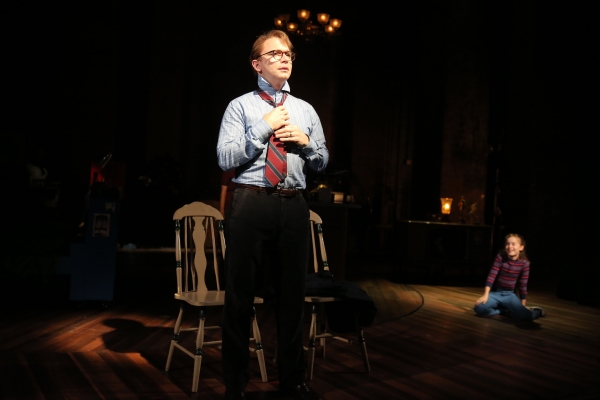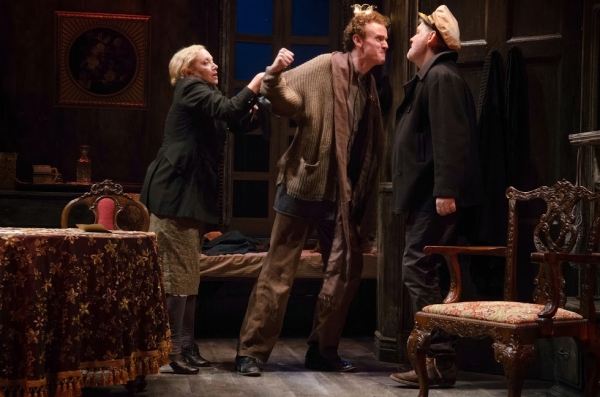The Wall Street Journal has given me extra space this week to review three particularly interesting New York openings, Fun Home, Juno and the Paycock, and The Snow Geese. Here’s an excerpt.
* * *
Most musicals are more or less traditional boy-gets-girl romantic comedies. “Fun Home” contains a romantic subplot–albeit a lesbian one–but otherwise Alison Bechdel’s powerfully poignant 2006 comic-book memoir about the suicide of her homosexual father couldn’t be less traditional, and the decision of Lisa Kron and Jeanine Tesori to turn Ms. Bechdel’s “family tragicomic” (her phrase) into a musical will likely strike many theatergoers as little short of lunatic. Not so. Ms. Kron and Ms. Tesori have done a skillful job of reshaping a gripping but elusively idiosyncratic piece of source material into a fluid, quick-paced chamber musical. No, it’s not “Guys and Dolls” by the longest of shots, but “Fun Home,” judging by the preview that I saw last Saturday, has real mainstream audience appeal. The problem is that the stage version, though it faithfully follows the plot of the book, is fundamentally untrue to its distinctive tone–and even if you’ve never read “Fun Home,” I think you’ll suspect that something is off.
 Bruce Bechdel (Michael Cerveris), the anti-hero of “Fun Home,” is a high-school English teacher who doubles as the funeral director of the small Pennsylvania town in which he and his family live. Alison (played at various ages by Beth Malone, Alexandra Socha and Sydney Lucas), his boyish daughter, gradually realizes that she is, as she puts it, a “butch lesbian.” At 19 she comes out to her parents and falls in love, after which Helen (Judy Kuhn), her mother, blindsides Alison by confessing that Bruce is a closeted gay man who has had surreptitious sexual relations with his teenaged students….
Bruce Bechdel (Michael Cerveris), the anti-hero of “Fun Home,” is a high-school English teacher who doubles as the funeral director of the small Pennsylvania town in which he and his family live. Alison (played at various ages by Beth Malone, Alexandra Socha and Sydney Lucas), his boyish daughter, gradually realizes that she is, as she puts it, a “butch lesbian.” At 19 she comes out to her parents and falls in love, after which Helen (Judy Kuhn), her mother, blindsides Alison by confessing that Bruce is a closeted gay man who has had surreptitious sexual relations with his teenaged students….
In her book, Ms. Bechdel tells this agonizing tale frankly but with what she correctly describes as “cool aesthetic distance.” The dry, detached candor of her first-person narration is part of what made “Fun Home” so distinctive, and it is almost entirely missing from the stage version. So, too, are the jagged edges of Bruce’s personality. In the book he is a tightly wound emotional cripple whose self-loathing manifests itself in brutal verbal assaults on his wife and children. In the musical, by contrast, he is shy, scared, ingratiating and full of repressed desires to which he gives voice in song, something that the real-life Bruce could never have done. Meanwhile, Ms. Bechdel herself has undergone no less drastic a transformation, becoming in the show an adorable tomboy from whom the irony with which she holds the world at arm’s length has been stripped away.
I don’t deny that these changes, or something not unlike them, were probably necessary in order to turn “Fun Home” into a musical. But their collective effect has been to soften and sweeten Ms. Bechdel’s book, at times almost beyond recognition….
 Sometimes you don’t need to say much about a show beyond the fact that it’s open, so here goes: The Irish Repertory Theatre is presenting a rare American revival of “Juno and the Paycock,” Sean O’Casey’s 1924 masterpiece about a ne’er-do-well blowhard and his hope-starved wife, in which the title roles are played by J. Smith-Cameron, one of America’s greatest stage actors, and Ciarán O’Reilly, the company’s much-admired producing director. I doubt that “Juno” will receive a more eloquent or sympathetic production in my lifetime than this one….
Sometimes you don’t need to say much about a show beyond the fact that it’s open, so here goes: The Irish Repertory Theatre is presenting a rare American revival of “Juno and the Paycock,” Sean O’Casey’s 1924 masterpiece about a ne’er-do-well blowhard and his hope-starved wife, in which the title roles are played by J. Smith-Cameron, one of America’s greatest stage actors, and Ciarán O’Reilly, the company’s much-admired producing director. I doubt that “Juno” will receive a more eloquent or sympathetic production in my lifetime than this one….
Sharr White, who scored a surprise success on Broadway last season with “The Other Place,” is back again with “The Snow Geese,” a freshly minted school-of-Chekhov period piece set in 1917 (there’s even a Ukrainian cook) in which we meet a not-quite-upper-middle-class American family whose financial luck has just run out. I had trouble with the first act, which never seemed to take wing, and though the second act was more involving, I felt at play’s end that the last word had been spoken an hour and a half earlier by one of the unhappy characters: “God knows what would happen if we ever stopped talking and actually did something around here.”…
* * *
Read the whole thing here.
Alfred Hitchcock’s 1930 film version of Juno and the Paycock:
Terry Teachout on the arts in New York City
An ArtsJournal Blog
